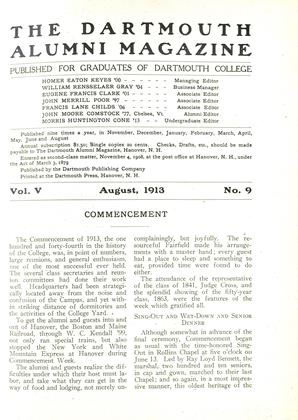Once more the College has been asked to participate in a celebration in honor of her greatest alumnus. On the twenty-eighth of August the restored birthplace of Daniel Webster at Franklin, N. H., will be dedicated with appropriate exercises. The complete program has not yet been announced, but the chief address is to be given by Congressman Samuel W. McCall '74, who, it will be remembered, was the principal speaker at the Webster Centennial in 1901. President Nichols will speak for the College, Governor. Felker for the State, and it is hoped that President Wilson may be able to respond for the country at large.
The Webster Birthplace Association has labored long and diligently for the accomplishment of the now completed restoration. Through the efforts of ex-Senator William E. Chandler and other enthusiastic admirers of the great statesman, this association was founded on October 26, 1910, and the work of gathering funds was begun at once. The state legislature appropriated the sum of $1,500 for the work, and further subscriptions from interested citizens have swelled the fund. The purchase of the original Webster farm for $1,800 and the restoration of the house do not, however, complete the work of the association. It is now necessary to raise $20,000 for the endowment of the memorial in order that a permanent caretaker be engaged to keep the house and the farm in proper condition.
The present officers of the association include, as is fitting, at least eight men who hold degrees from Dartmouth. They are as follows: President, Hon. William E. Chandler, Concord; first vice-president, Chief Justice Frank N. Parsons, Franklin; second vice-president, Hon. Clarence E. Carr, Andover; third vice-president, Hon. F. G. Webster, Boston; treasurer, Dr. John W. Staples, Franklin; clerk, Omar A. Towne, Franklin; trustees, Hon. A. W. Sulloway, Hon. Jacob H. Gallinger, Hon. Edward G. Leach, Professor J. R. Eastman, Augustine R. Ayres, Frank R. Woodward, Hon. Warren F. Daniell, Frank Proctor, and Charles S. Collins.
The farm on which Daniel Webster spent his boyhood days consists of one hundred and thirty acres of land situated about three, miles from the city of Franklin, in what was once the town of Salisbury. Webster himself retained a deep liking for the old home throughout his life, and during his later years made frequent pilgrimages to the spot. One of his last visits was that of August, 1847, when he was invited to deliver addresses at Grafton and Lebanon on the occasion of the opening of the Northern Railroad ; in these speeches he reaffirmed his loyalty to that section of the state in which he was born, and prophesied a great future for it. The railroad, by the way, cut through the old farm.
The birthplace itself has been reconstructed to look exactly as it did in 1782 when Webster was born. By careful excavation the identical stones 'on which the cabin rested were discovered, and that part of the house which still remained intact was moved back upon these foundations from which it was taken some forty years ago. It was then found not difficult to restore the missing portions. The work was much simplified by the existence of sketches of the old home, authorized by Webster himself.
The main part of the house consists of two chief rooms, one the ancient kitchen and living-room of the family, the other a sort of parlor. A trap door in the floor of the kitchen admits to the cellar where the original stone foundations are visible. The huge fireplace, So necessary to. the life of the early settlers, is perhaps the most interesting feature of the restoration. It is constructed of the hand-made, numbered bricks that were used in its original building; some three thousand of these were found in the process of excavating the cellar. Other interesting articles uncovered in the ruins include the oaken staves and bottom of the bucket that hung for years in the well near the corner of the house. The well, with its quaint sweep, has been restored and adds much to the picturesqueness of the homestead.
The restoration of the Webster birthplace adds one more to the interesting historic pilgrimage spots of New England. None other, however, has the attraction for. Dartmouth men that the little farm in Franklin will possess, and it is hoped that alumni returning to visit the familiar spots of their college days will be led by the sentiment of old tradition to make the little journey to this humble home of a famous man.
 View Full Issue
View Full Issue
More From This Issue
-
 Article
ArticleCOMMENCEMENT
August 1913 -
 Article
ArticleTHE STATE OF DARTMOUTH COLLEGE
August 1913 -
 Sports
SportsATHLETICS AT DARTMOUTH
August 1913 By Charles Ernest Bolser -
 Article
ArticleTHAYER SCHOOL OF CIVIL ENGINEERING
August 1913 By Robert Fletcher, Director -
 Class Notes
Class NotesCLASS OF 1878
August 1913 By William D. Parkinson,, WM. D. PARKINSON, -
 Class Notes
Class NotesCLASS OF 1908
August 1913 By Lawrence M. Symmes,, LAURENCE M. SYMMES,
Article
-
 Article
ArticleAEGIS BOARD ELECTED
June, 1912 -
 Article
ArticleSaturday Morning Session
June 1924 -
 Article
ArticleFaculty Articles
May 1954 -
 Article
ArticleNew Blood: The Class of '71
OCTOBER 1967 -
 Article
ArticleMiscellany
January 1951 By C. E. W. -
 Article
ArticleSHOULD THE NEW GRADUATION TRADITION OF SMASHING CLAY MUGS BE DROPPED? IF SO, WHAT SHOULD REPLACE IT?
September 1993 By kai Singer '95


